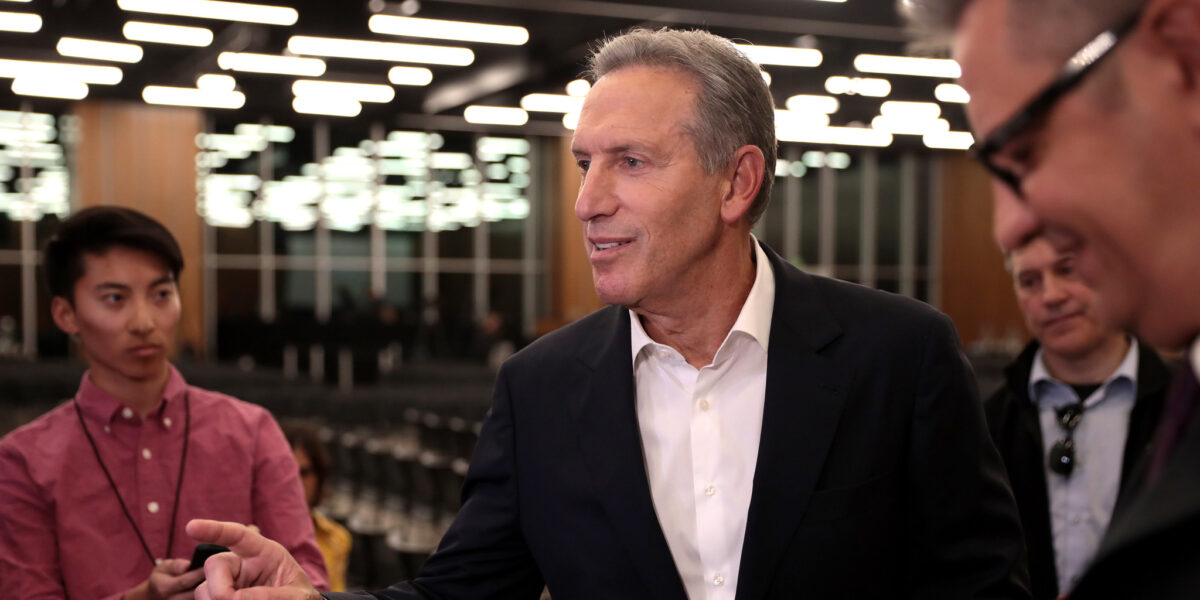Starbucks perennial CEO and album cover, Howard Schultz, quit again this week, for the third time, but you know he’ll be back.
Schultz is Starbucks, even more than it’s overpriced and verbose. He’s already come and gone thrice, usually to “explore” a run as Democratic presidential nominee.
This step down may be due to a looming appearance at Bernie Sanders’ U.S. Senate committee on What the Hell is Wrong with this Country? Schultz tried dodging it but Sanders boxed him in. It should be beautiful and gory. I’m clearing next Wednesday.
Sanders wants to grill Schultz on Starbucks’ appalling response to efforts by its workers, known bombastically as partners, to unionize. Through superhuman effort, they managed to get legally “certified” to bargain at about 300 of Starbucks 14,500 U.S. stores. Yet not one has a contract yet.
This is a little-known reality of union struggles. It’s utter hell and hoops to leap through, just getting your unit signed up and recognized as bargaining agent. Then your troubles begin. The company can stall endlessly, fire key people and close unionized stores, as Starbucks has. In Canada six stores are certified but only one has a contract. Then Starbucks increased pay at all outlets here except that one. It’s not just smart, it’s mean. It’s mean smart.
Schultz is a gem of a symbol of owner resistance to workers’ right to speak through their own organization.
“If they had faith in me and my motives, they wouldn’t need a union,” he says. Trump couldn’t have said it better, and didn’t. (“I alone can fix it.”) It’s true paternalism: you embrace their neediness while denying their equality. Workers rarely join unions just for money, it’s almost always about respect. Same for their bosses, who want dominance and deference.
Schultz indeed sees himself as more than a CEO, which is why he keeps fingering a presidential run. Though perhaps he should run for Czar, whom Russian peasants before the revolution thought would fix everything if only he knew their plight. He calls himself a “centrist” with advanced views on things like same-sex marriage, in the mould of the Clintons and Tony Blair.
Centrist is an apt term, with its geometric echoes. Centrists “triangulate” to appeal to “moderates” and progressives without disrupting anything basic. Margaret Thatcher called Blair her greatest achievement. They won a few elections with that gutless formula. Then came the deluge of Trump, Brexit etc.
Sanders is a perfect antagonist for Schultz.
He broke the glass ceiling of U.S. political rhetoric by calling himself a socialist — while winning elections and almost getting the Democratic presidential nomination. When asked what he means by socialist, he always starts with FDR and the 1930s New Deal. He rants joyously against millioneahs and billioneahs, as Roosevelt revelled in their hate. (A New Yorker cartoon of the 1930s had plutocrats in furs and top hats saying, “Let’s go down to the Bijou and boo Roosevelt on the newsreel.”)
Sanders has learned to include race and gender issues but he still tends to lead with workers, even as workers are no longer mostly miners and factory hands, they’re in cafés and malls. Not just workers but unions, which give them a (not automatic) chance to speak in their own voice vs. being ventriloquized.
Earlier this week, I wandered into the new Starbucks at the corner of Bathurst and College Streets where a bank once was. In the old days Starbucks would scout around an area they wanted to enter and buy up the leases from under cherished neighbourhood cafés on the corners. They did it in the 1990s leading to the epic battle of Dooney’s on Bloor Street. I know because the head of Starbucks Canada told me when they were suing for peace after realizing they’d chosen the wrong corner in the Annex to die on.
Schultz began by destroying local heroes. Now he’s replacing defunct banks. Metaphors can be so irritating.
This column originally appeared in the Toronto Star.



